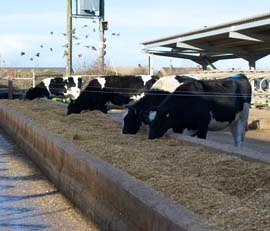Maize silage additives – are they cost effective?

Livestock producers looking to make the most out of home-grown maize silage could be failing to reach optimum yields due to aerobic spoilage and heating.
But maize silage additives, although an added expense at harvesting, could offer a means of preserving silage quality while boosting efficiency and improving animal performance.
Biotal international technical support manager John Bax says many farmers run the risk of forage shortages as a result of aerobic spoilage, by failing to use inoculants (additives) to combat heating.
“Maize is an interesting crop; when you look at it under the microscope you see it is covered in all sorts of bacteria and yeast, and that’s why it will ferment once it’s harvested,” explains Mr Bax.
“And with the presence of air the yeast starts to become active and use some of the lactic acid, which is preserving the silage, as an energy supply. The pH then starts to rise and the silage bugs become active – it’s their growth and respiration that creates the heat – and if left long enough you will get moisture which encourages the growth of mould.”
Aerobic spoilage and heating, cause three main problems for producers: a reduction in ME, problems with palatability, and the potential for moulds and toxins to affect intake and digestive function in the animal, adds Mr Bax.
“We therefore need some mechanism to prevent the process of heating, and additives work really well because you can control the heating which is particularly important if you are feeding a TMR because you don’t want to heat up the other rations.”
He recommends a two-step approach to tackling spoilage: the use of an effective oxygen barrier and treatment of the crop with an inoculant. “The two things work very well together, giving you control over heating.”
Mole Valley Farmers dairy product manager Peter Isaac says producers striving to maintain maize silage quality should see the use of additives as a means of increasing feed energy content for the animals.
“If the silage is heating up you are losing energy which is then not available to the animal, and any spoilage that happens during feed out is reducing the overall energy value of the crop,” he adds.
“Additives are a cost to the farmer – anywhere between £1-1.20/t – but I think you have to look at the science behind them because they will do what it says on the tin. You need every possible tonne of feed, and if you are losing feed value then that’s less you have available for the animals in the winter.”
Kingshay senior technical consultant Martin Yeates says when you have a heating problem then using a silage additive is going to control the job. “But you need to make sure you choose the right product for the right job – there is not a one size fits all answer,” he adds.
dairynews
